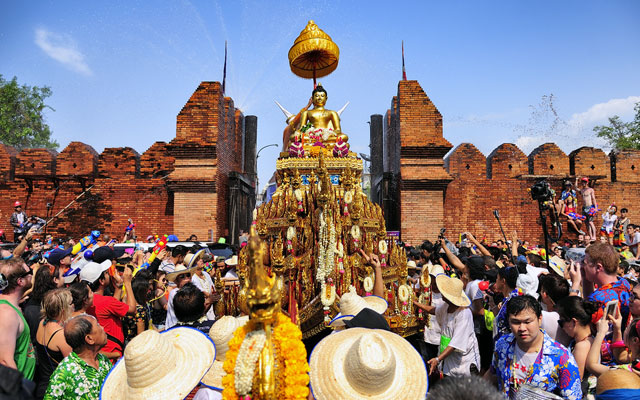Chiang Mai’s travel trade is bracing for muted Songkran celebrations as the smog crisis is likely to put a dent on visitor arrivals to the northern city and the surrounding provinces for the upcoming Thai New Year.
Thailand’s biggest annual festival fall during April 13-15 each year, and Chiang Mai province has traditionally been among the country’s most popular destinations to celebrate the water festival. Last year, Chiang Mai welcomed a total of 150,000 local and international visitors during the Songkran period.

While the Tourism Authority of Thailand (TAT) projected a three per cent increase in domestic tourism during Songkran this year, Chiang Mai and the northern region, however, are likely to see a fall of about 11 per cent in visitor numbers due to ongoing air pollution.
Industry members on the ground are predicting even more dire impacts from the smog. Damrong Ong-arj, president of Chiang Mai Tourism Business Association, suggested that the number of foreign and local tourists to Chiang Mai could drop by up to 50 per cent during the festival if the situation remains unchanged.
Not only are large declines projected for the Japanese and European markets over health concerns, many locals have also cancelled their room bookings in Chiang Mai, Chiang Rai and Mae Hong Son provinces, he added.
“We strongly urge the government and authority to resolve the problem ahead of Songkran festival in order to save business,” Damrong implored.
La-Iaid Bungsrithong, president of Hotels Association Northern Chapter and general manager of Ratilanna Riverside Spa Resort, also forecasted the average occupancy rate for Chiang Mai hotels to dip to 60 per cent from the usual 70-75 per cent during the first half of April, inclusive of the Songkran festival.
An occupancy drop of 10 to 20 per cent during Songkran is likely for The Legend Hotel in Chiang Rai, assistant general manager Suwat Fuwan told TTG Asia, as many tourists have shifted to other provinces to avoid the smog.
However, many groups from Europe who had already booked accommodation are going ahead with their trips as planned, Suwat shared.
Chiang Mai was recently ranked the most polluted city in the world amid its worst-ever air poulltion, although the Geo-Informatics and Space Technology Development Agency reported earlier this week that the number of burning hot spots in Chiang Mai and the North have declined 50 per cent following Thai prime minister Prayut Chan-o-cha’s visit to Chiang Mai on April 2 and demanded solutions to tackle the severe pollution.
TAT, which issued a travel advisory to Chiang Mai earlier, said it is cooperating with Chiang Mai Municipality to install water tunnels, fountains, water curtains and artificial waterfalls at key locations. It is also urging high office buildings as well as attractions to help reduce dust by cleaning their premises and spraying water ahead of the Chiang Mai Songkran Festival 2019.




















